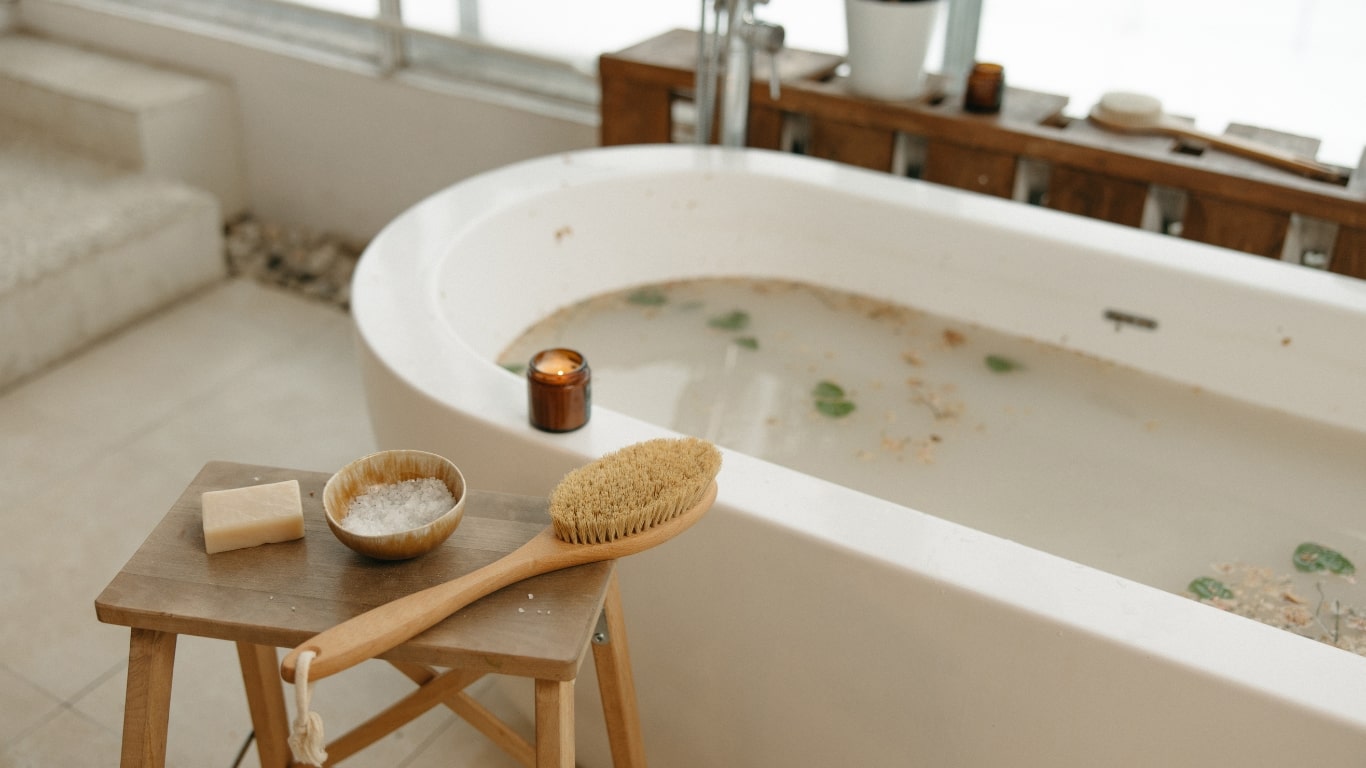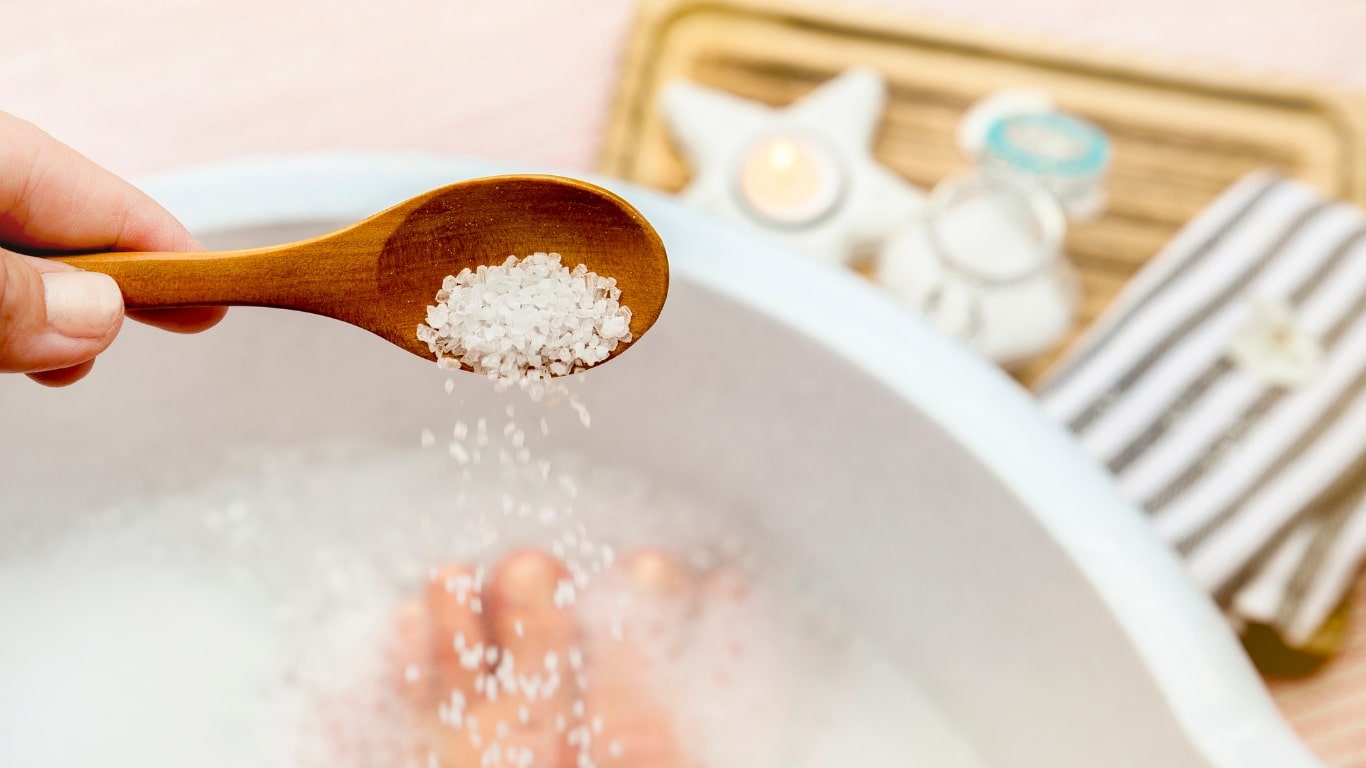
Introduction
Epsom salt baths have long been revered for their therapeutic properties, offering a simple yet effective way to relax, rejuvenate, and restore the body. Derived from the mineral-rich waters of Epsom, England, this natural compound, scientifically known as magnesium sulfate, has been used for centuries to alleviate a wide range of ailments. In this comprehensive guide, we’ll explore the benefits, uses, and best practices for incorporating Epsom salt baths into your wellness routine.
What is Epsom Salt?
Epsom salt is a naturally occurring mineral compound composed of magnesium, sulfur, and oxygen. Unlike common table salt, Epsom salt is not actually a salt but a pure mineral compound. Its unique properties make it a popular choice for a variety of therapeutic applications, particularly in the form of a bath soak.
Magnesium, one of the primary components of Epsom salt, plays a crucial role in over 300 biochemical reactions in the body. It’s essential for muscle and nerve function, regulating blood sugar levels, and supporting immune health. Sulfate, the other key component, aids in detoxification, improves nutrient absorption, and helps form proteins in joints and brain tissue.
Benefits of Epsom Salt Baths
Muscle Relaxation and Pain Relief
Epsom salt baths are widely known for their ability to relieve muscle tension and soreness. The magnesium in Epsom salt is absorbed through the skin, helping to relax muscles, reduce inflammation, and promote recovery. This makes Epsom salt baths particularly beneficial for athletes, those with physically demanding jobs, or anyone experiencing muscle fatigue.
In addition to muscle relaxation, Epsom salt baths can help alleviate pain associated with conditions such as arthritis, fibromyalgia, and chronic back pain. The anti-inflammatory properties of magnesium sulfate help reduce swelling and discomfort in joints and tissues.
Stress Relief and Mental Wellness
The calming effects of an Epsom salt bath extend beyond physical relaxation. The magnesium in Epsom salt can help lower cortisol levels, a hormone associated with stress. This helps create a sense of calm and well-being, making it an excellent remedy for stress relief after a long day.
Regular Epsom salt baths can improve sleep quality by promoting relaxation and reducing stress. The magnesium absorbed through the skin helps regulate the production of melatonin, a hormone that controls sleep-wake cycles.
Detoxification
Epsom salt baths can support the body’s natural detoxification processes. The sulfate in Epsom salt aids in flushing out toxins and heavy metals from the cells, making it an effective way to cleanse the body. This detoxifying effect can leave you feeling refreshed and revitalized.
Skin Health
Epsom salt acts as a natural exfoliant, gently removing dead skin cells and leaving the skin soft and smooth. It can also help soften rough patches, such as those on the feet, elbows, and knees.
Epsom salt baths can provide relief for various skin conditions, including eczema, psoriasis, and acne. The anti-inflammatory and antimicrobial properties of magnesium sulfate help soothe irritated skin and reduce the risk of infection.
Improved Circulation and Cardiovascular Health
Soaking in an Epsom salt bath can improve blood circulation, which is vital for overall health. The warmth of the bath combined with the magnesium in the Epsom salt helps dilate blood vessels, improving blood flow and reducing the risk of cardiovascular issues.
Regular Epsom salt baths may help lower blood pressure by relaxing blood vessels and reducing stress. This can be particularly beneficial for those at risk of hypertension.
How to Take an Epsom Salt Bath?

1. Choosing the Right Epsom Salt
When selecting Epsom salt for your bath, it’s essential to choose a high-quality, pure product without added fragrances, dyes, or other chemicals. Look for Epsom salt labeled as USP grade, which indicates that it meets the standards set by the United States Pharmacopeia for purity and quality.
While plain Epsom salt is the most common, you can also find Epsom salt infused with essential oils or botanicals for an enhanced experience. Lavender-infused Epsom salt, for example, combines the relaxing effects of magnesium with the calming scent of lavender.
2. Preparing the Bath
Start by filling your bathtub with warm water. The ideal temperature is between 92°F and 100°F (33°C to 38°C). Avoid using hot water, as it can be dehydrating and may cause dizziness or discomfort.
For a standard-sized bathtub, add 2 cups (approximately 500 grams) of Epsom salt to the water. If you have a larger tub or prefer a more intense soak, you can increase the amount to 3 to 4 cups (750 to 1000 grams).
Stir the water with your hand to help the Epsom salt dissolve. Make sure the salt is fully dissolved before getting into the tub to avoid sitting on undissolved crystals.
3. Duration and Frequency
To fully experience the benefits of an Epsom salt bath, soak for at least 15 to 20 minutes. This allows enough time for the magnesium and sulfate to be absorbed through the skin.
You can take an Epsom salt bath 2 to 3 times a week, depending on your needs and how your body responds. For those with specific health conditions, such as chronic pain or skin issues, more frequent baths may be beneficial. However, it’s essential to listen to your body and adjust the frequency as needed.
4. Post-Bath Care
After your Epsom salt bath, rinse off with clean water to remove any residual salt from your skin. This step is especially important if you have sensitive skin or are prone to dryness. Follow up with a moisturizer to lock in hydration and keep your skin soft.
Soaking in a warm bath can be dehydrating, so it’s important to drink plenty of water before and after your bath. Staying hydrated helps flush out toxins and supports the detoxification process.
Special Considerations and Precautions
- Consultation with Healthcare Providers
Health Conditions: If you have any underlying health conditions, such as kidney disease, diabetes, or cardiovascular issues, consult your healthcare provider before incorporating Epsom salt baths into your routine. Magnesium sulfate can affect certain medical conditions, so it’s important to seek professional advice.
Pregnancy: Pregnant women should also consult with their healthcare provider before taking Epsom salt baths. While many find it helpful for relieving pregnancy-related discomfort, it’s essential to ensure it’s safe for both mother and baby.
- Allergic Reactions and Sensitivity
Skin Sensitivity: If you have sensitive skin or are prone to allergies, do a patch test before taking a full Epsom salt bath. Dissolve a small amount of Epsom salt in water and apply it to a small area of your skin. If you experience any redness, itching, or irritation, avoid using Epsom salt.
Essential Oils: If you’re using Epsom salt infused with essential oils, be aware of potential allergic reactions. Some essential oils can cause skin irritation, especially in higher concentrations. Always use products with properly diluted essential oils, or add your own essential oils to the bath in moderation.
Frequently Asked Questions
What happens if you don’t rinse off after an Epsom salt bath?
If you don’t rinse off after an Epsom salt bath, residual salt may remain on your skin, which can lead to dryness and irritation, especially if you have sensitive skin. The salt can draw moisture away from your skin, leaving it feeling tight or itchy. Rinsing off with clean water helps remove any leftover salt, preserving the softness and hydration of your skin after the bath.
What happens if you put too much Epsom salt in a bath?
Adding too much Epsom salt to a bath can increase the risk of skin irritation and dehydration, as the high concentration of magnesium sulfate may draw excessive moisture from your skin. Additionally, overuse of Epsom salt can lead to symptoms like dizziness, lightheadedness, or even nausea due to the body’s absorption of too much magnesium. It’s best to stick to the recommended dosage of 2 to 4 cups per standard bathtub to avoid these issues.
Is Epsom salt bath safe for kidneys?
For most people, Epsom salt baths are generally safe, but if you have kidney disease or any kidney-related health issues, it’s important to consult your healthcare provider before using Epsom salt baths. The magnesium in Epsom salt is absorbed through the skin, and those with impaired kidney function may have difficulty processing excess magnesium, potentially leading to imbalances or complications.
Why do I feel weird after an Epsom salt bath?
Feeling weird or lightheaded after an Epsom salt bath can be due to several factors, such as dehydration, over-absorption of magnesium, or overheating from the warm water. The relaxing effect of the bath can also cause a drop in blood pressure, leading to feelings of dizziness or fatigue. It’s important to stay hydrated, avoid too hot water, and get up slowly after a bath to minimize these effects.
Shop for Epsom Salt
When you’re ready to experience the full benefits of an Epsom salt bath, choosing the right product is essential. At our shop, we offer high-quality Epsom salt that’s perfect for creating a spa-like experience in the comfort of your home. Rich in magnesium sulfate, our Epsom salt dissolves quickly and works to soothe sore muscles, reduce stress, and promote relaxation. Whether you’re looking to enhance your wellness routine, ease tension after a workout, or simply unwind, our Epsom salt is the perfect addition to your bath. Plus, we offer convenient sizes and competitive pricing, making it easy to enjoy the therapeutic benefits anytime you need. Buy Epsom Salt in Singapore today.
Conclusion
Epsom salt baths offer a wide range of health benefits, from relieving muscle pain and reducing stress to improving skin health and promoting detoxification. By incorporating this simple and natural remedy into your wellness routine, you can enjoy both physical and mental rejuvenation. Whether you’re looking to unwind after a long day, soothe sore muscles, or support your overall health, an Epsom salt bath can be a powerful tool in your self-care arsenal.
Remember to choose high-quality Epsom salt, follow proper bath preparation guidelines, and consider any personal health concerns before indulging in this therapeutic practice. With regular use, you’ll likely find that Epsom salt baths become a cherished ritual in your quest for well-being.
